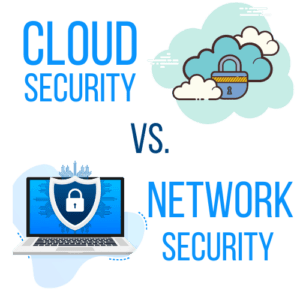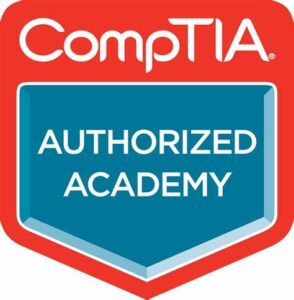
About IT Security
IT security, at its core, refers to the practice of safeguarding computer systems, networks, and data from theft, damage, or unauthorized access.
As we increasingly rely on digital solutions for everything from communication and entertainment to banking and healthcare, the importance of protecting our digital footprint becomes paramount.
Think of IT Security as the digital equivalent of locking your doors at night or setting up a security system for your home. Just as you wouldn’t want strangers accessing your personal belongings, in the digital realm, we strive to keep sensitive information—like personal details or financial data—safe from cybercriminals and malicious software.
As technology evolves, so do the methods of those looking to exploit it, making IT Security an ever-evolving field that is in high demand in today’s interconnected world.

Cloud vs Network Security
IT Security is an over-arching term that refers to protecting digital assets:
- on the cloud
- in a network environment
- and the convergence of the two
At its core, both cloud and network security aim to protect digital assets, but they focus on different environments and attack vectors.
Network security deals with safeguarding the integrity, confidentiality, and availability of data as it is transmitted across or accessed from networks.
This includes measures to guard against unauthorized intrusions, malware, and other potential threats that could exploit vulnerabilities in a network’s infrastructure.
Techniques like firewalls, intrusion detection systems, and Virtual Private Networks (VPNs) are typical elements of network security.
Cloud security specifically addresses the challenges of protecting data, applications, and services hosted in cloud environments.
This includes not only the security measures the cloud provider implements, but also the policies, procedures, and technologies that customers put in place to ensure their data remains safe within the cloud.
Cloud security often involves areas like secure access control, encryption, and threat detection.
So, while there is overlap between network and cloud security, network security primarily concerns digital security on a network infrastructure and cloud security primarily protects digital assets on cloud-based resources.
Are You Interested in a Career in IT Security?
What Does the Term Cybersecurity Mean?
IT security and cybersecurity are related terms that people can find confusing, as they often overlap, but they have slightly different focuses within the realm of protecting information systems and data.
IT security includes a wide range of practices, policies, and technologies that aim to safeguard data and resources within an organization’s IT infrastructure.
This can involve physical security measures, network security, access control, data encryption, and more. IT security is concerned with protecting not only digital assets but also physical assets that may have an impact on the overall security of an organization’s operations.
Cybersecurity is a subset of IT security that specifically focuses on protecting digital information and systems from cyber threats.
Cybersecurity involves measures and strategies aimed at safeguarding computer systems, networks, and data from threats. It often includes technologies such as firewalls, intrusion detection systems, antivirus software, and security protocols designed to prevent, detect, and respond to cyberattacks.
How Do I Get a Job in IT Security?
IT security certificates provide evidence of a job candidate’s knowledge, skills, and dedication to cybersecurity, making them a valuable asset for employers looking to strengthen their cybersecurity posture and protect their digital assets.
Employers seek candidates with IT security certificates for several compelling reasons:
Demonstrated Expertise: IT security certificates indicate that candidates have undergone specialized training and education in the field of cybersecurity. Possessing these certificates shows that candidates have acquired a comprehensive understanding of security principles, practices, and technologies, making them more adept at protecting an organization’s digital assets.

Industry-Recognized Skillset: Certifications from reputable organizations like CompTIA and others are widely recognized in the industry. Employers value candidates who hold such certifications as they provide a standardized measure of a candidate’s skill level and knowledge in IT security.
Employer Risk Mitigation: Candidates with IT security certifications are better equipped to identify vulnerabilities, implement effective security measures, and respond to incidents promptly. Hiring certified professionals helps organizations reduce the risk of cyberattacks and data breaches.
Regulatory Compliance: Many industries, such as healthcare, finance, and government, are subject to stringent regulatory requirements for data protection and cybersecurity. Hiring candidates with relevant IT security certifications can help organizations ensure compliance with industry-specific regulations and avoid costly penalties for non-compliance.
Enhanced Reputation and Trust: Demonstrating a commitment to cybersecurity through hiring certified professionals enhances an organization’s reputation and fosters trust among clients, partners, and stakeholders. A team of skilled professionals with recognized certifications can set an organization apart from competitors and demonstrate its dedication to safeguarding sensitive information.
What IT Jobs Can I Get with Certification(s)?
Once certified, you will have the knowledge and skills needed to begin supporting network security within an organization. Students who complete this course will be able to identify security threats and vulnerabilities and help respond to and recover from security incidents.
Here are five potential options:
IT Support Technician: In this role, you would assist users with technical issues, troubleshoot hardware and software problems, and provide basic network support.
Help Desk Analyst: Help desk analysts provide remote assistance to users who are facing technical problems. They answer queries, diagnose issues, and provide solutions over the phone or through online communication channels.
Network Technician: As a network technician, you might be responsible for setting up, maintaining, and troubleshooting network devices and infrastructure.

System Administrator Assistant: Working as an assistant to a system administrator, you would be involved in tasks such as server maintenance, user account management, and basic security configurations.
Junior IT Security Analyst: This role involves assisting in the implementation and monitoring of security measures to protect an organization’s computer systems and networks.
Remember, these roles can have variations in job titles and responsibilities depending on the organization. Entry-level positions are excellent opportunities to learn and grow within the field of computer and network administration. As you gain experience and expertise, you can explore more advanced roles and specializations.
GET TRAINED | GET CERTIFIED | GET THE JOB

It all starts with a conversation with one of our helpful Admissions Coordinators, who help you every step of the way through the application process, from determining which financial aid option may be right for you, to deciding on a program path that helps you achieve your career dreams.
All you need is a high school diploma or GED. No college degree or prior experience is required to apply. We will teach you the knowledge and skills you need to start your career in IT!

